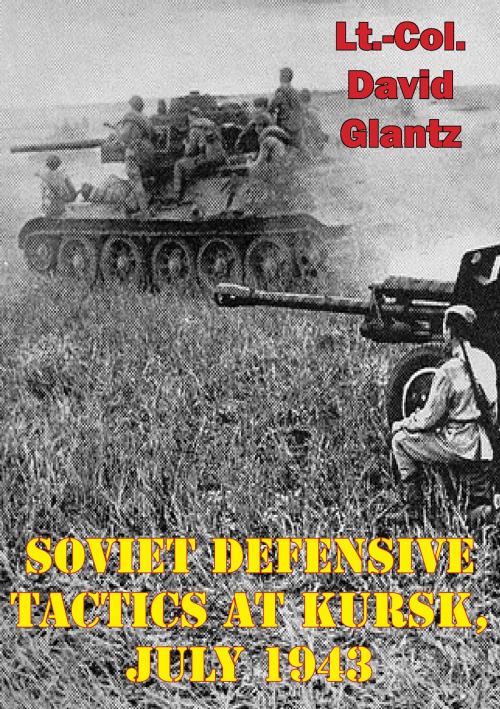Soviet Defensive Tactics At Kursk, July 1943
Nonfiction, History, Germany, European General, Military, United States| Author: | Colonel David M Glantz | ISBN: | 9781786250438 |
| Publisher: | Verdun Press | Publication: | November 6, 2015 |
| Imprint: | Verdun Press | Language: | English |
| Author: | Colonel David M Glantz |
| ISBN: | 9781786250438 |
| Publisher: | Verdun Press |
| Publication: | November 6, 2015 |
| Imprint: | Verdun Press |
| Language: | English |
In his classic work, On War, Carl von Clausewitz wrote, “As we shall show, defense is a stronger form of fighting than attack.” A generation of nineteenth century officers, nurtured on the study of the experiences of Napoleon and conditioned by the wars of German unification, had little reason to accept that view. The offensive spirit swept through European armies and manifested itself in the regulations, plans, and mentality of those armiehe events of 1939, 1940, and 1941 in Poland, France, and Russia respectively again challenged Clausewitz’ claim of the superiority of the defense and prompted armies worldwide to frantically field large armored forces and develop doctrines for their use. While blitzkrieg concepts ruled supreme, it fell to that nation victimized most by those concepts to develop techniques to counter the German juggernaut. The Soviets had to temper a generation of offensive tradition in order to marshal forces and develop techniques to counter blitzkrieg. In essence, the Soviet struggle for survival against blitzkrieg proved also to be a partial test of Clausewitz’ dictum. In July 1943, after arduous months of developing defensive techniques, often at a high cost in terms of men and material, the Soviets met blitzkrieg head-on and proved that defense against it was feasible. The titanic, grinding Kursk operation validated, in part, Clausewitz’ views. But it also demonstrated that careful study of force organization and employment and application of the fruits of that study can produce either offensive or defensive victory. While on the surface the events of Kursk seemed to validate Clausewitz’ view, it is often forgotten that, at Kursk, the Soviets integrated the concept of counteroffensive into their grand defensive designs. Thus the defense itself was meaningless unless viewed against the backdrop of the renewed offensive efforts and vice versa. What Kursk did prove was that strategic, operational, and tactical defenses could counter blitzkrieg.
In his classic work, On War, Carl von Clausewitz wrote, “As we shall show, defense is a stronger form of fighting than attack.” A generation of nineteenth century officers, nurtured on the study of the experiences of Napoleon and conditioned by the wars of German unification, had little reason to accept that view. The offensive spirit swept through European armies and manifested itself in the regulations, plans, and mentality of those armiehe events of 1939, 1940, and 1941 in Poland, France, and Russia respectively again challenged Clausewitz’ claim of the superiority of the defense and prompted armies worldwide to frantically field large armored forces and develop doctrines for their use. While blitzkrieg concepts ruled supreme, it fell to that nation victimized most by those concepts to develop techniques to counter the German juggernaut. The Soviets had to temper a generation of offensive tradition in order to marshal forces and develop techniques to counter blitzkrieg. In essence, the Soviet struggle for survival against blitzkrieg proved also to be a partial test of Clausewitz’ dictum. In July 1943, after arduous months of developing defensive techniques, often at a high cost in terms of men and material, the Soviets met blitzkrieg head-on and proved that defense against it was feasible. The titanic, grinding Kursk operation validated, in part, Clausewitz’ views. But it also demonstrated that careful study of force organization and employment and application of the fruits of that study can produce either offensive or defensive victory. While on the surface the events of Kursk seemed to validate Clausewitz’ view, it is often forgotten that, at Kursk, the Soviets integrated the concept of counteroffensive into their grand defensive designs. Thus the defense itself was meaningless unless viewed against the backdrop of the renewed offensive efforts and vice versa. What Kursk did prove was that strategic, operational, and tactical defenses could counter blitzkrieg.




![Cover of the book The History Of The Canterbury Mounted Rifles 1914-1919 [Illustrated Edition] by Colonel David M Glantz](https://www.kuoky.com/images/2014/june/300x300/9781782892465-b3yA_300x.jpg)










![Cover of the book Helmet For My Pillow [Illustrated Edition] by Colonel David M Glantz](https://www.kuoky.com/images/2015/november/300x300/9781786252036-cMF2_300x.jpg)